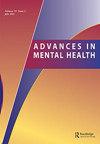Peer support for children of parents with mental illness (COPMI) in Australia: responses from children, parents and facilitators of the CHAMPS peer support program
IF 1.4
Q3 PSYCHIATRY
引用次数: 3
Abstract
ABSTRACT Objective Early interventions for children whose parents have a mental illness, comprising the provision of age-appropriate information about mental health, positive coping strategies, and meaningful social and emotional connections, are identified as preventive interventions for childhood health and wellbeing. The aim of this study was to evaluate the CHAMPS (Children and Mentally Ill Parents) peer support program that is designed to connect, support and educate this cohort of children and their parents/carers. Method The CHAMPS program was reviewed and co-designed by clinicians, parent participants, peer workers and children in 2017 and 2019. The revised modularised program incorporates peer facilitators and shared lived experience as a way for participants to build understanding of their own experiences and strategies for coping. Children, parent/carers and program facilitators were interviewed for this study. Results This paper presents findings from interviews conducted with 8- to 12-year-old children (N = 20) who completed CHAMPS; parents/carers (N = 17) and program facilitators (N = 10). Children reported that the program lessened isolation and feelings of self-blame for their parents’ struggles; and parents reported benefits from supported communication with their children in explaining their diagnosis and in understanding the needs of their child. Discussion It was concluded that early intervention peer support programs for children can have multiple positive impacts on the family, highlighting the importance of psychoeducation and improved family communication, as well as connections to peers for supporting families where parents have a mental illness.澳大利亚父母患有精神疾病(COPMI)的子女的同伴支持:来自CHAMPS同伴支持计划的儿童、父母和辅导员的回应
摘要目的对父母患有精神疾病的儿童进行早期干预,包括提供与年龄相适应的心理健康信息、积极应对策略和有意义的社会和情感联系,是儿童健康和福祉的预防性干预措施。本研究的目的是评估CHAMPS(儿童和精神病患者父母)同伴支持计划,该计划旨在连接,支持和教育这群儿童及其父母/照顾者。方法通过2017年和2019年临床医生、家长参与者、同行工作者和儿童对CHAMPS项目进行回顾和共同设计。修订后的模块化课程包括同伴辅导员和分享生活经验,作为参与者了解自己的经历和应对策略的一种方式。本研究对儿童、家长/照顾者和项目协调员进行了访谈。结果对8 ~ 12岁的儿童(N = 20)进行了访谈,并完成了CHAMPS;家长/照顾者(N = 17)和项目促进者(N = 10)。孩子们报告说,这个项目减轻了他们对父母挣扎的孤立感和自责感;家长们报告说,在解释他们的诊断和理解孩子的需求方面,与孩子进行支持性交流是有好处的。结论是,儿童早期干预同伴支持项目可以对家庭产生多种积极影响,突出了心理教育和改善家庭沟通的重要性,以及支持父母患有精神疾病的家庭与同伴的联系。
本文章由计算机程序翻译,如有差异,请以英文原文为准。
求助全文
约1分钟内获得全文
求助全文

 求助内容:
求助内容: 应助结果提醒方式:
应助结果提醒方式:


